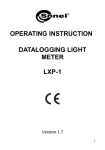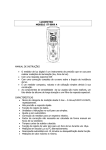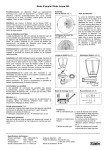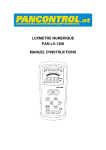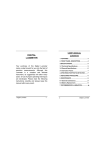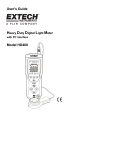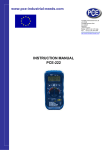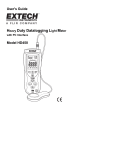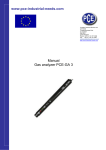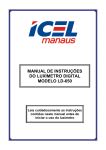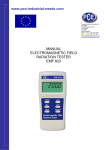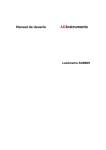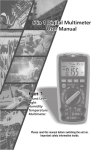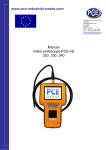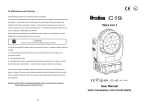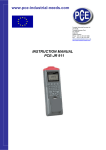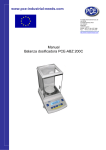Download www.pce-industrial-needs.com Manual DATALOGGING LIGHT
Transcript
www.pce-industrial-needs.com Tursdale Technical Services Ltd Unit N12B Tursdale Business Park Co. Durham DH6 5PG United Kingdom Phone: +44 ( 0 ) 191 377 3398 Fax: +44 ( 0 ) 191 377 3357 [email protected] http://www.industrial-needs.com/ Manual DATALOGGING LIGHT METER - PCE-174 [email protected] CONTENT 1. 2. 3. 4. 5. 6. 7. 8. 9. 10. 11. INSTRUCTION ................................................................................................................. 3 FEATURES ...................................................................................................................... 3 SPECIFICATIONS ........................................................................................................... 3 NAME OF PARTS AND POSITIONS............................................................................... 4 OPERATING INSTRUCTIONS ........................................................................................ 4 BATTERY CHECK-UP & REPLACEMENT ..................................................................... 5 SPECTRAL SENSITIVITY CHARACTERISTIC............................................................... 5 MAINTENANCE ............................................................................................................... 5 RECOMMENDED ILLUMINATION .................................................................................. 6 CONNECTION ................................................................................................................. 6 INSTALLING THE SOFTWARE ...................................................................................... 6 2 [email protected] 1. INSTRUCTION ¾ ¾ ¾ ¾ ¾ The digital illuminance meter is a precision instrument used to measure illuminance (Lux, footcandle) in the field. It is meet CIE photopic spectral response. It is fully cosine corrected for the angular incidence of light. The illuminance meter is compact, tough and easy to handle owing to its construction. The light sensitive component used in the meter is a very stable, long-life silicon photo diode and spectral response filter. 2. FEATURES ¾ ¾ ¾ ¾ ¾ ¾ ¾ ¾ ¾ ¾ ¾ ¾ ¾ ¾ ¾ ¾ ¾ ¾ Light-measuring levels ranging form 0.1Lux~0.1kLux/0.01FC~0.01kFC,repeatedly. High accuracy and rapid response. Data-hold function for holding measuring values. Unit and sign display for easy reading. Automatic zeroing. Meter corrected for spectral relative efficiency. Correction factor need not be manually calculated for non-standard light sources. Short rise and fall times. Peak-hold function for tracing the peak signal of light pulse with least duration 10μs and keep it. Capable of selecting measuring mode in Lux or FC scale alternatively. Auto power off 15minutes or disable AUTO power off. Maximum and minimum measurements. Relative reading . Easy to read large backlit display USB output connect with pc 4 Level ranging 99 values in memory ,that could be read on the meter. More than 16000 values records datalogger. 3. SPECIFICATIONS Display :3-3/4 digit LCD with high speed 40 segment bar graph. Measuring Range: x,400.0 Lux,4000 Lux,40.00 KLux and 400.0 KLux /40.00 FC,400.0 FC,4000 FC,40.00 KFC. NOTE: 1FC=10.76Lux,1KLux=1000Lux,1KFC=1000FC ¾ Over range Display: LCD will show “OL” symbol. ¾ Spectral Response: CIE Photopic. (CIE human eye response curve). ¾ Spectral Accuracy: CIE Vλ function f1’ 6% ¾ Cosine Response: f2’ 2% Accuracy: ±3% rdg±0.5%f.s.(<10,000Lux), ±4% rdg±10d.(>10,000Lux) ¾ Repeatability: ±3% ¾ Sampling Rate: 1.3 times/sec of analog bar-graph indication;1.3times/sec of digital display. Datalogger sampling could be setup. ¾ Photo Detector: One silicon photo diode and spectral response filter. ¾ Operating temperature & Humidity : 0 to 40 (32 to 104 ) & 0% to 80% RH. ¾ Storage Temperature & Humidity : -10 to 50 (14 to 140 ) & 0% to 70% RH. ¾ Power Source: 1 piece 9V battery. ¾ Photo detector Lead Length: 150cm (approx.); ¾ Photo detector Dimensions: 115L×60W×20H(mm); ¾ Meter Dimensions: 170L×80W×40H; ¾ Weight: 390g. ¾ Accessories: Carry case, instruction manual, battery. ¾ ¾ 3 [email protected] 4. NAME OF PARTS AND POSITIONS 1. Power Control key: The power switch key turns the illuminance meter ON or OFF. 2. LCD Display: 3-3/4 digit displays with a maximum reading of 3999,and the indicating signs of measured values, unit function symbols and decimal points etc are display. 3. UNITS key: Pressing this key selects taking measurement of illuminance in Lux or FC scale(1FC =10.76 LUX). 4. BACK-LIGHT and LOAD control key: Back light control and load the records. 5. REC and SET key: memory the values or set the time , the sampling rate, and Enable the AUTO power off or ont. 6. Peak Hold key: Peak Hold recorder control key. 7. Data-Hold key: Data Hold control key. 8. RANGE key: change the range. 400.0lux -> 4000lux ->40,000lux ->400,000lux(40.00FC >400.0FC ->4000FC ->40,000FC). 9. MAX/MIN key: Maximum and minimum reading recorder control key. 10. REL key: Relative reading control key. 5. OPERATING INSTRUCTIONS 1. 2. 3. 4. 5. 6. 7. 8. 9. 10. 11. 12. 13. 14. Power-up: Press the power key to turn the meter ON or OFF. Selecting the Lux or FC scale: Set the range selection switch to desired Lux or FC range. Remove the photo detector cap and face it light source in a horizontal position. Press the REC/SET key and RANGE/APO key, Enable the AUTO power off or Disable this function. Read the illuminance nominal from the LCD display. Over range: If the instrument only displays “OL”, the input signal is too strong, and a higher range should be selected. The range will show on the down of the LCD, LUX :400 -> 4K -> 40k -> 400k; FC: 40 -> 400-> 4k -> 40k. Data-Hold mode: Press the hold key to select Data-Hold mode. When HOLD mode is selected, the illuminance meter stops all further measurements. Press the HOLD key again to exit Data-Hold mode. Then it resumes normal operation. Peak-Hold mode: Press the PEAK key to choose Pmax or Pmin recorder mode, and expose the photo detector to light pulse measuring field. Press the PEAK key again to exit PEAK recorder mode, then the meter will resume normal operation. Maximum and Minimum mode: Press MAX/MIN key to choose the Maximum (MAX) reading, Minimum (MIN) reading and current reading (MAX/MIN blink) recorder mode. Press MAX/MIN key again to exit this mode. Relative reading mode: Press REL key to enter Relative mode. The display shown zero value and the current reading will be stored as a zero-in value. Press again to exit this mode. USB mode: connect with pc with USB, the “ ” will displays in the screen. Back-light function: Press the Backlight key to turn on. Press again to turn off. When the measurement is completed, replace the photo detector cap and turn the meter off. Setup time and sampling rate: Press the MEM/SETUP and UNITS key start to setup the time and sampling. The first setup target is The hour Press key ”PEAK or REL“ to choose the object of the setting Press “REL” key to choose object to repeat as below process: - Hour->minter->second-> sampling-> month -> day ->week -> year ->hour ……. Press PEAK key to choose the object and repeat as below process: - Hour ->year ->week -> day -> month ->sampling ->second ->minter ->hour -.>year …….. Press MAX/MIN key to add object of setting Press HOLD key to reduce the object of setting Hold key of MEM/SETUP and UNITS to exit the setting time and sampling mode, and then confirm. 4 [email protected] 15. MEM function: Press key of MEM/SET to save the present data. HOLD key of LOAD 5s start to load the records Press key of MAX/MIN to add the number of records. Press key of HOLD to reduce the number of records. After you do that you must hold the key of LOAD 5s to resume normal operation . 16. DATALOGGER function: SETUP the time and sampling rate first, the default sampling rate is 1s. Hold the key of MEM/SETUP 5s, start the data logger function, the MEM on the screen will be bicker. If the memory IC is full, the memory number will show ‘OL’. Press the key of MEM/SETUP 5s, stop the data logger function, then the meter will resume normal operation. Then the data logger number will return to 1, you could start your records again. 17. HOLD the key of MEM/SETUP and LOAD 5s to clear the 99 memory. 6. BATTERY CHECK-UP & REPLACEMENT 1. As the battery power is not sufficient, LCD will display low battery, and replacement of one new battery is required. 2. After turning off the meter, disconnect the battery cover with a screwier. 3. Disconnect the battery from the instrument and replace it with a standard 9V battery and go for the cover. 7. SPECTRAL SENSITIVITY CHARACTERISTIC ¾ To the detector, the applied photo diode with filters makes the spectral sensitivity characteristic almost meet C.I.E.(INTERNATIONAL COMMISSION ON ILLUMINATION) Photo curve V (λ) as the following chart described. 8. MAINTENANCE 1. 2. 3. 4. The white plastic disc on the top of the detector should be cleaned with a damp cloth when necessary. Do not store the instrument where temperature or humidity is excessively high. The reference level, as marker on the face plate, is the tip of the photo detector globe. The calibration interval for the photo detector will vary according to operational conditions, but generally the sensitivity decreases in direct proportion to the product of luminous intensity by the operational time. In order to maintain the basic accuracy of the instrument, periodic calibration is recommended. 5 [email protected] 9. RECOMMENDED ILLUMINATION 1FC=10.76Lux OFFICE FACTORY HOTEL STORE HOSPITAL SCHOOL LOCATIONS Conference, Reception room Clerical work Typing drafting Visual work at production line Inspection work Electronic parts assembly line Packing work, Entrance passage Public room, Cloakroom Reception Cashier Indoors Stairs Corridor Show window, Packing table Forefront of show window Sickroom, Warehouse Medical Examination Room Operating room, emergency treatment Auditorium, Indoor Gymnasium Class room Laboratory, Library, Drafting, room Lux 200~750 700~1,500 1,000~2,000 300~750 750~1,500 1,500~3,000 150~300 100~200 200~500 750~1,000 150~200 750~1,500 1,500~3,000 100~200 300~750 750~1,500 100~300 200~750 500~1,500 FC 18~70 65~140 93~186 28~70 70~140 140~279 14~28 9~18 18~47 70~93 14~18 70~140 140~279 9~18 28~70 70~140 9~28 18~70 47~140 Connecting to pc System requirements: Windows 98 or windows 2000 (or higher) Minimum hardware requirements Pc or notebook, 90MHz Pentium of faster, 32Mb Ram, At least 5Mb free hard disk space screen resolution 800×600. 10. Connection 1, Switch the light meter on 2, Plug the other end of the connecting cable to serial interface of the PC (USB). 3, Plug the USB line connecting cable 13.6mm jack plug into the meter socket 5, Start the light meter software. 6, Selecting the COM port 3. note select the 4 COM. (Note: you should better switch the light meter on before you plug the USB line connecting cable 13.6mm jack plug into the meter) 11. Installing the software z Stare windows z z z Close any applications possibly open before installing the “CEM.LINK” software. Insert the CD into the CD-drive. Enter x:\setup in the command line and press OK. The files setup.exe and the help file will be copied onto the hard disk (selected path: c:\program files\ Lightmeter). x is the drive-letter of your CD-drive ,e.g. ”g”. z Now follow the installation program instructions. z Once the software is installed, switch on the meter. z Start the software. z Selected the COM port 3. note is 4. z If the connection is in order, the following display will be seen on the screen. z If the connection is not in order, the message “NO CONNECTION” appears on the screen. 6 [email protected] In this direction will find a vision of the measurement technique: http://www.industrial-needs.com/measuring-instruments.htm NOTE: "This instrument doesn’t have ATEX protection, so it should not be used in potentially explosive atmospheres (powder, flammable gases)." 7







